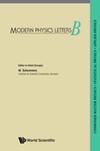Thermal characterization of hybrid nanofluid with impact of convective boundary layer flow and Joule heating law: Dual solutions case study
IF 1.8
4区 物理与天体物理
Q3 PHYSICS, APPLIED
引用次数: 0
Abstract
This study emphasizes the dual exposition of the impact of convective condition and the significant effects of magnetic field, heat source and velocity slip on hybrid nanofluid flow over the exponentially shrinking sheet. The hybrid nanofluid is regarded as a contemporary variety of nanofluid; consequently, it is utilized to enhance the efficiency of heat transfer. By applying the Tiwari–Das model, the key objective of the current research is to investigate the impact of involving factors Biot number, Eckert number, volume fraction, magnetohydrodynamic (MHD), slip and suction on the temperature and velocity profiles. In addition, the Nusselt number and skin friction variations have been explored against the suction effect on the solid volume fraction of copper [Formula: see text] [1–3%] and the Biot number [Formula: see text] [1–3%]. The nonlinear partial differential equations are converted to a set of an ordinary differential equations by incorporating exponential similarity vectors. Eventually, ordinary differential equations are rectified utilizing MATLAB bvp4c solver. The results demonstrate the presence of dual exposition for suction with varying values of copper volume fraction and the Biot number. The heat transmission rate is observed to escalate in both cases as the strength of the Biot and Eckert numbers intensifies in the range of 1–3%. In summary, the results show that duality and non-unique solutions occur in the aiding flow situation when the suction [Formula: see text], while there is no flow and unique solutions of hybrid nanofluid feasible when [Formula: see text].受对流边界层流动和焦耳加热定律影响的混合纳米流体的热特性:双解案例研究
本研究强调对流条件的影响以及磁场、热源和速度滑移对指数收缩片上混合纳米流体流动的显著影响的双重阐述。混合纳米流体被认为是当代纳米流体的一种,因此可用于提高传热效率。通过应用 Tiwari-Das 模型,当前研究的主要目标是研究涉及因素 Biot 数、Eckert 数、体积分数、磁流体动力(MHD)、滑移和吸力对温度和速度曲线的影响。此外,针对铜的固体体积分数[计算公式:见正文][1-3%]和比奥特数[计算公式:见正文][1-3%]的吸力效应,还探讨了努塞尔特数和皮肤摩擦的变化。通过加入指数相似向量,将非线性偏微分方程转换为一组常微分方程。最后,利用 MATLAB bvp4c 求解器对常微分方程进行修正。结果表明,在铜体积分数和比奥特数值不同的情况下,存在双重吸力。在这两种情况下,随着比奥特数和埃克特数的强度在 1-3% 的范围内增强,热传导率都会上升。总之,结果表明,当吸力[计算公式:见正文]时,在助流情况下会出现二元性和非唯一解;而当吸力[计算公式:见正文]时,混合纳米流体不存在流动,且唯一解可行。
本文章由计算机程序翻译,如有差异,请以英文原文为准。
求助全文
约1分钟内获得全文
求助全文
来源期刊

Modern Physics Letters B
物理-物理:凝聚态物理
CiteScore
3.70
自引率
10.50%
发文量
235
审稿时长
5.9 months
期刊介绍:
MPLB opens a channel for the fast circulation of important and useful research findings in Condensed Matter Physics, Statistical Physics, as well as Atomic, Molecular and Optical Physics. A strong emphasis is placed on topics of current interest, such as cold atoms and molecules, new topological materials and phases, and novel low-dimensional materials. The journal also contains a Brief Reviews section with the purpose of publishing short reports on the latest experimental findings and urgent new theoretical developments.
 求助内容:
求助内容: 应助结果提醒方式:
应助结果提醒方式:


